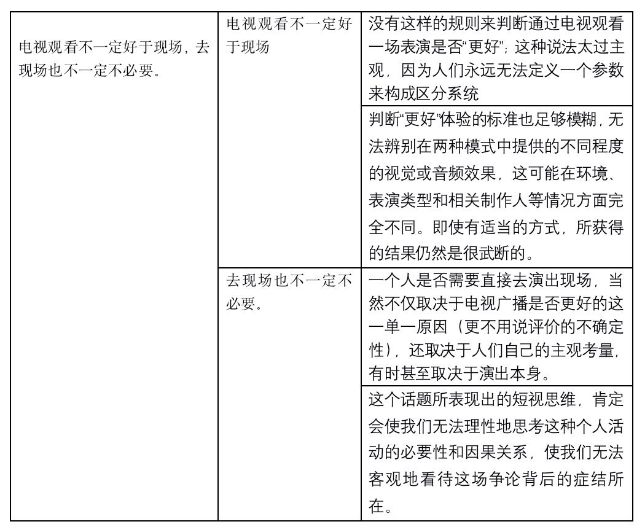There is no need to attend a live performance (for example, a play or concert) because seeing it at home on television is better. To what extent do you agree or disagree??
题目大意
没有必要参加现场表演(例如,戏剧或音乐会),因为在家里看电视会更好。你在多大程度上同意或不同意?
写作思路解析
电视观看不一定好于现场,去现场也不一定不必要。
1. 没有这样的规则来判断通过电视观看一场表演是否“更好”;这种说法太过主观,因为人们永远无法定义一个参数来构成区分系统,但一旦进行评估,这必须是头一步。我们怎么能保证一项活动总是比另一项更好呢?我同意一些人的观点,即电视上呈现的场景似乎比来现场观看的观众所看到的场景更近、更多样化;毕竟,视频制作人有权站在他们想要的任何地方,以确保拍摄出令人印象深刻的镜头。不过,整场演出的沉浸感,究竟是坐在沙发上的观众,还是身临其境体验表演的观众能真正感受到,就很难说了,因此前者不可能比后者“更好”。判断“更好”体验的标准也足够模糊,无法辨别在两种模式中提供的不同程度的视觉或音频效果,这可能在环境、表演类型和相关制作人等情况方面完全不同。即使有适当的方式,所获得的结果仍然是很武断的。
2. 同样的心态也可以参与到是否有必要参加现场表演的思考中,因为如果不在不同的情况下进行评估,任何明确的结论总是,不值得信任。一个人是否需要直接去演出现场,当然不仅取决于电视广播是否更好的这一单一原因(更不用说评价的不确定性),还取决于人们自己的主观考量,有时甚至取决于演出本身。谁能说观众在演唱会或剧院露面来表达他们对歌手或演员的崇拜或敬佩是徒劳的呢?以及大量的观众对表演者来说是不必要的,通过给予积极的反馈来激发他们的激情和舞台表演?这个话题所表现出的短视思维,肯定会使我们无法理性地思考这种个人活动的必要性和因果关系,使我们无法客观地看待这场争论背后的症结所在。
提纲梳理见下
写作示范
I would argue in this essay that the premise given in the prompt is certainly too subjective, and it therefore makes no sense about the result elicited.
There is no such a rule to judge whether watching a performance through television is “better” or not; subjectivity prevails this claim, since one can never define a parameter to make the system of differentiation, but this has to be the very first step once an appraisal happens. Just how can we guarantee that one activity is always better than another? I am not reluctant to agree with the people holding that the scenarios that are presented on the television would seem closer and more diverse than those viewed by the audience who have came to the live show; after all, the video makers have the privilege to stand wherever they want to ensure the most impressive shots. However, whether the immersion of the entire show can be sensed as that truly and greatly by viewers sitting on the couch as by those who are physically put into the environment to experience the full range of the performance is hard to tell, and the former is thus impossible to be deemed “better” than the latter. The set of criteria in the judgement of a “better” experience is also ambiguous enough without the ability to discern the varying degrees of visual or audio effects provided in the two modes, which can be totally different in terms of situations like the surroundings, the type of performances and the related producers, etc. Even if there is a scheme in place, the values assigned are still arbitrary.
The same mindset can be also involved in thinking whether there is need to attend the live performance, since if not assessed in varying situations, a set of personal purposes if you will, any explicit conclusion would always be too absolute to be trustful. Whether one needs to go directly to the scene of a live performance is certainly not only decided by the single reason of whether television broadcasts are better (let alone the uncertainty of the evaluation), but the subjective consideration held by people themselves, or sometimes, the performance per se. Who is to say that it is to no avail for the audience to express their worship or admiration to the singers or actors by showing up in the gigs or theatres? And that sizable audiences are not necessary to the performers by giving out positive feedbacks to arise their passions and stage performances? The myopic thinking exhibited by the topic certainly distracts us from thinking the necessity of this personal activity and the causal relationship in a rational way, from being objective and from seeing the cruxes that are lying behind the controversy.
In conclusion, it is the absurdity of certain utterances in the topic that compel me to question the reasonableness in the notion and I truly veto that the television broadcasts of the shows truly dwarf the related live performances and that the presence of audience is truly unnecessary.


